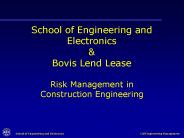Lecture 7: Systems Engineering - PowerPoint PPT Presentation
1 / 28
Title:
Lecture 7: Systems Engineering
Description:
People often bear ultimate responsibility for system operation. ... http://www.sun.com/access/wp-aatm/ Japanese Tourist Visiting Canada ... – PowerPoint PPT presentation
Number of Views:53
Avg rating:3.0/5.0
Title: Lecture 7: Systems Engineering
1
Lecture 7 Systems Engineering
09/10/99
2
Definition of a System
- A system is an interacting combination, at any
level of complexity, - of people, materials, tools, machines, software,
facilities, and procedures - designed to work together for some common purpose
(Chapanis, 1996)
3
Systems Engineering
- Systems -designed to meet user needs
- System development is iterative
- System development follows specs
- System engineering multi-disciplinary
4
Elements of Systems
5
Examples of Systems
- Production Systems
- systems for building and assembling products,
e.g., computers and automobiles - Transportation Systems
- e.g., automobiles, aircraft, ships, and
railroads - Information Processing Systems
- e.g., telephone systems, air-traffic control
systems, automated bank tellers. - Weapon Systems
- E.g., missiles, bombers, and tanks
- Service Systems
- E.g, police and fire systems, gas stations, and
warehouses.
6
The Space Shuttle
7
Titan Rocket System Failure
8
Military Systems
9
Crowded Skies and Runways
10
Making Systems Safer
11
Nuclear Power
12
Consequences of System Failure
13
System Hierarchies
14
The Role of People in Systems
- People are either inside or outside a system.
- e.g., orbiting satellite communication system
must be maintained - failure to consider human role can lead to unsafe
or inefficient systems. - People often bear ultimate responsibility for
system operation. - E.g, ship captain or aircraft pilot
- We can't sue automation, so people are ultimately
responsible. - Many accidents are attributed to human error.
15
Types of Organization
- User Tool combinations
- E.g., a carpenter using a saw, a farmer using a
rake, or a mechanic using a wrench - Operator-Machine combinations
- an operator using a computer terminal, or a
driver operating an automobile - Multi-person systems
- E.g., banking systems, air-traffic-control
systems, or postal systems
16
Systems Engineering Team
17
System Life Cycle
09/10/99
18
Operational Need Determination
- Example of an Operational-Need Document
- The Fourth National Bank and Trust co.
- existing and Planned Operational Capabilities
- additional Operation Capability Required
- exploitable Technology
- constraints
- user Classes
09/10/99
19
Operational Concept Formulation
- Example of an Operational Concept that satisfies
the Operational Need for Automated Bank Tellers - bank Customer Transaction Concept
- allowable Bank Customer Transactions
- allowable Number of Transactions
- logistics and Maintenance Concept
- management Concept
- training Concept
09/10/99
20
Concept Exploration
- Major HF activities during concept exploration
- assist in allocation of functions
- conduct trade studies to evaluate costs and
benefits of alternatives - develop user-system interface requirements
- prototype and evaluate user interfaces
09/10/99
21
Universal Access to ATM
- http//www.sun.com/access/wp-aatm/
- Japanese Tourist Visiting Canada
- Spanish Businessman with Low Vision
- Blind Student Making a Deposit
22
Concept Demonstration
- Design concept is mocked up, simulated and
tested. - Does it meet
- requirements for staffing, operating,
maintaining, and supporting the system? - dimensional requirements for workspace, etc.,
- safety, personnel and training requirements
09/10/99
23
Full Scale Engineering Development
- Full prototype is developed and tested.
- Prototype includes all necessary hardware and
software - Major HF tasks
- Usability testing with product and documentation
- Reference of testing results to performance
requirements
09/10/99
24
Production and Deployment
- Multiple copies of system are produced and
distributed - Major HF tasks
- training operators and users on system
- evaluating usability or operability of system
- identifying changes to be made for later versions
09/10/99
25
Operation and Maintenance
- Systems delivered and in use
- Major HF tasks
- conduct follow-on tests of operator satisfaction
with use and maintenance of system - results of tests serve as guides to engineering
changes for subsequent versions
09/10/99
26
System Retirement
- In this phase the system is retired from use,
scrapped or replaced - Concerns about environmental conversation and
recycling of materials - Ease and expense of disposal should be considered
during system design
09/10/99
27
Life Cycle Control Points
- There are control points throughout the system
lifecycle - Control points are milestones times at which
evaluations are made - Evaluations consist of reviews and audits
- System engineer describes what has been done and
defends activities
09/10/99
28
Questions asked at Control Points
- Is the work - to date- satisfactory?
- Do any changes need to be made in the
development? - Are the budgets and timetables for completion
realistic?































